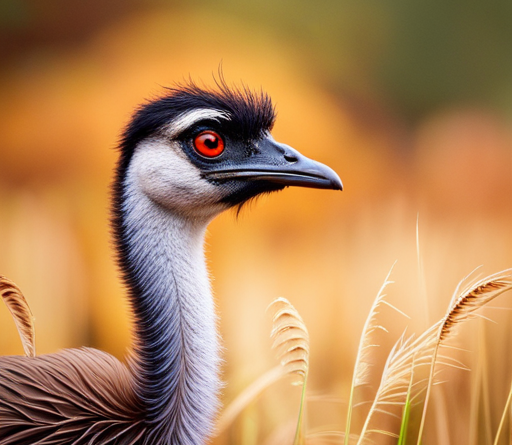
Are you curious about the secret behind the incredible health and vitality of emus? Well, get ready to be amazed! Emu Diet Secrets Revealed is here to uncover the fascinating facts about what these majestic creatures eat to stay in tip-top shape.
Did you know that emus consume a staggering 2-3 pounds of food each day? That’s right, they are true eating machines! In this guide, we will delve into the emu’s diet, exploring the importance of leafy greens, the protein power of insects, and the balanced approach to fruits and vegetables.
We will also reveal the secrets of hydration, the role of seeds and grains, and the supplements that emus rely on. Get ready to discover the secrets of the emu diet and incorporate them into your own life for a healthier, more vibrant you!
Key Takeaways
- Emu diet consists of a variety of foods including meat, fruits, vegetables, whole grains, and legumes.
- Leafy greens are an important part of the emu diet, providing essential nutrients for optimal health.
- Emus supplement their diet with protein-rich insects, which support muscle development and tissue repair.
- Incorporating a variety of fruits and vegetables in the emu diet adds flavor and ensures diverse nutrients.
Emu Diet Basics
To understand the Emu Diet Basics, you should focus on incorporating nutrient-rich foods into your daily meals. There are some misconceptions surrounding the Emu diet, but when done correctly, it can provide numerous benefits for your health.
One common misconception is that the Emu diet consists mainly of meat. While Emu meat is indeed a part of the diet, it’s essential to include a variety of other foods as well. Fruits, vegetables, whole grains, and legumes should all be incorporated into your meals to ensure a well-rounded and balanced diet.
The Emu diet offers several benefits for your overall health. Emu meat is low in fat and cholesterol, making it a heart-healthy choice. It’s also rich in protein, essential amino acids, and omega-3 fatty acids, which are all crucial for maintaining muscle mass and promoting brain health.
In addition to the nutritional benefits, the Emu diet can help with weight management. The high protein content of Emu meat helps to increase satiety and reduce cravings, making it easier to stick to a healthy eating plan.
Leafy Greens: the Foundation of Their Diet
Leafy greens form the basis of their diet, providing essential nutrients for optimal health. Emus have evolved to thrive on a diet rich in leafy greens, which offer numerous benefits. These greens are packed with vitamins, minerals, and antioxidants that support overall well-being. Let’s take a closer look at some of the key nutrients found in leafy greens and explore a few delicious recipes to incorporate them into your own diet.
| Nutrient | Benefits | Recipes |
|---|---|---|
| Vitamin A | Supports eye health and immune system | Spinach salad with carrots and bell peppers |
| Vitamin K | Promotes bone health and blood clotting | Kale and quinoa stir-fry |
| Folate | Essential for cell growth and development | Swiss chard and white bean soup |
Leafy greens also provide dietary fiber, which aids in digestion and helps maintain a healthy weight. The high water content in these greens promotes hydration, while the low calorie content makes them a great choice for those watching their caloric intake.
To incorporate leafy greens into your diet, try adding them to salads, stir-fries, or soups. Experiment with different varieties such as spinach, kale, and Swiss chard to discover your favorite flavors and textures. By including these nutrient-rich greens in your meals, you can enjoy the benefits of the emu diet and support your own well-being.
Protein Power: Emus and Insects
Emus supplement their diet with protein-rich insects, which play a vital role in their overall nutrition and health. These fascinating flightless birds have a unique approach to obtaining their protein, setting them apart from their chicken counterparts. Here are some key points to consider when comparing the nutritional benefits of emu and insect diets:
-
Emus vs. Chickens:
-
Emus have a higher protein requirement compared to chickens due to their larger size and more active lifestyle.
-
Chickens rely heavily on plant-based protein sources, while emus have evolved to include insects in their diet for a more diverse and complete protein intake.
-
Nutritional Benefits:
-
Insects provide emus with essential amino acids, vitamins, and minerals that contribute to muscle development, tissue repair, and overall growth.
-
The high protein content in insects also supports the production of feathers, which are crucial for insulation and flightlessness.
-
Sustainability of Insect Protein:
-
Emus’ preference for insects isn’t only nutritionally beneficial but also environmentally sustainable, as insects have a smaller ecological footprint compared to traditional livestock farming.
-
Insect protein production requires significantly less land, water, and feed resources, making it a more sustainable option for meeting the protein needs of emus.
A Balanced Approach to Fruits and Vegetables
Now, let’s take a closer look at how you can achieve a balanced approach to incorporating fruits and vegetables into your diet. Fruits and vegetables are essential for a healthy diet as they provide a wide range of nutrients and benefits. Incorporating a variety of fruits and vegetables into your daily meals not only adds flavor and color but also ensures that you are getting a diverse range of vitamins, minerals, and antioxidants.
To help you understand the benefits of fruits and the importance of vegetable variety, here’s a table that highlights some key information:
| Fruit Benefits | Vegetable Variety |
|---|---|
| High in fiber and vitamins | Different colors offer different nutrients |
| Natural source of antioxidants | Leafy greens provide essential vitamins and minerals |
| Can help reduce the risk of chronic diseases | Cruciferous vegetables contain cancer-fighting compounds |
| Hydrating and refreshing | Root vegetables are high in fiber and provide sustained energy |
| Can aid in weight management | Allium vegetables boost heart health and have anti-inflammatory properties |
Hydration Secrets: Emus and Water
To stay hydrated, you should prioritize drinking water regularly throughout the day. This is true not only for humans but also for emus. Emus, like other animals, can become dehydrated if they don’t have access to enough water.
Here are some interesting facts about emus and their hydration secrets:
-
Emus are native to Australia, where they’ve adapted to survive in arid and semi-arid environments. Due to their natural habitat, emus have evolved to be able to go for long periods without water.
-
However, when water is available, emus will drink large quantities to replenish their reserves. They’ve been observed drinking up to 9 liters of water in a single session.
-
Emus obtain water from various sources. They can drink from rivers, lakes, and other bodies of water when available. In addition, emus are known to extract moisture from plants, such as succulents, by pecking at them and consuming the liquid inside.
-
Emus have a unique adaptation that helps them conserve water. They can reabsorb water from their feces, which allows them to extract as much moisture as possible from their food and prevent dehydration.
Understanding the hydration secrets of emus can provide insights into how these fascinating birds survive in challenging environments. By prioritizing regular water intake, both you and emus can maintain optimal hydration levels and stay healthy.
The Role of Seeds and Grains
When striving to understand the emu’s diet secrets, it is essential to consider the significant role that seeds and grains play. These nutrient-rich foods are a vital component of an emu’s diet and play a crucial role in their digestion. Emus are natural foragers, and their diet primarily consists of plant material such as seeds, grains, fruits, and leaves.
Seeds and grains provide emus with a diverse range of essential nutrients, including carbohydrates, proteins, and fats. They are a rich source of energy, helping emus meet their daily nutritional needs. Additionally, seeds and grains contain high levels of dietary fiber, which aids in proper digestion and helps maintain a healthy gut.
To give you a better understanding of the variety of seeds and grains that form a part of an emu’s diet, here is a table showcasing some commonly consumed options:
| Seeds | Grains |
|---|---|
| Sunflower seeds | Corn |
| Pumpkin seeds | Wheat |
| Flaxseeds | Barley |
These seeds and grains are carefully selected to provide the emus with a balanced and nutritious diet. They are easily digestible, ensuring that emus can efficiently extract the maximum amount of nutrients from their food.
Now that we have explored the role of seeds and grains in an emu’s diet and digestion, let’s delve deeper into the next section: ‘Emu Diet Supplements: What’s on the Menu.’
Emu Diet Supplements: What’s on the Menu
Let’s now delve into what emu diet supplements are included in their menu. Emus have a unique dietary requirement that can’t always be met solely through their regular food sources. To ensure they receive all the necessary nutrients, emus are provided with a variety of supplements. Here are some of the supplements commonly included in an emu’s diet:
-
Omega-3 Fatty Acids: Emus require a diet rich in omega-3 fatty acids to maintain optimal health. These supplements help promote cardiovascular health and reduce inflammation in the body.
-
Vitamin and Mineral Mix: Emus may not always obtain all the necessary vitamins and minerals from their regular diet. To fill in any nutritional gaps, emu diet supplements often contain a carefully balanced mix of vitamins and minerals, including vitamin E, vitamin D, calcium, and selenium.
-
Protein Boosters: Emus require a protein-rich diet for growth and development. To ensure they receive adequate protein, emu diet supplements may include sources such as insects, mealworms, and fish meal.
While emu diet supplements offer several benefits, it’s important to consider both the pros and cons. On the positive side, they provide a convenient way to meet specific nutritional needs, especially when alternative sources of nutrients are limited. However, excessive reliance on supplements may lead to an imbalance in the emu’s natural diet and could potentially have negative effects on their overall health. Therefore, it’s crucial to strike a balance and consult with a qualified professional to determine the appropriate supplementation for each individual emu.
Emu Diet Tips for Incorporating Into Your Life
For a successful incorporation of the emu diet into your life, try adding a few essential supplements to your daily routine. These supplements can help enhance the effects of the emu diet and support your overall health and weight loss goals.
When it comes to emu diet meal plans, it’s important to focus on incorporating lean proteins, healthy fats, and nutrient-dense fruits and vegetables. Emu meat is a great source of lean protein and can be included in various dishes such as salads, stir-fries, or even as a substitute for other meats in your favorite recipes.
Additionally, incorporating emu oil into your diet can provide numerous health benefits. Emu oil is rich in omega-3 fatty acids, which are known to support heart health and reduce inflammation. It can be used as a cooking oil or added to smoothies and dressings.
Lastly, don’t forget to stay hydrated by drinking plenty of water throughout the day. Incorporating these tips into your emu diet won’t only support your weight loss efforts but also contribute to your overall well-being.
Frequently Asked Questions
Are There Any Specific Time Restrictions for Feeding Emus Leafy Greens?
When feeding emus in captivity, it’s important to ensure a variety in their diet, including leafy greens. Leafy greens can be provided to emus at any time during the day, as long as they’re fresh and of high quality. Incorporating these greens into their diet not only adds nutritional value but also helps mimic their natural feeding habits in the wild.
However, it’s vital to consider any time restrictions for feeding them these greens.
Can Emus Consume Fruits and Vegetables That Are Not in Their Natural Habitat?
Emus, known for their adaptability to different climates, can consume fruits and vegetables that aren’t in their natural habitat. These resilient creatures have the ability to adapt their diet to various food sources, including human food.
With proper training, emus can be trained to eat human food, expanding their dietary options. This adaptability showcases the versatility and flexibility of emus, making them intriguing and fascinating creatures to study.
Are There Any Specific Insects That Emus Prefer to Consume for Protein?
Are there specific insects that emus prefer to consume for protein?
Insect protein sources for emus play a vital role in their diet. These protein-rich insects contribute to the overall quality of their diet, ensuring they meet their nutritional needs.
Emus have been observed to consume a variety of insects, such as beetles, grasshoppers, and ants, which provide essential amino acids and micronutrients.
The inclusion of insect protein in their diet highlights the adaptability and resourcefulness of these fascinating creatures.
How Much Water Do Emus Need to Stay Hydrated?
To ensure optimal health and well-being, emus require an adequate amount of water for hydration. Water plays a crucial role in their daily diet, allowing for proper digestion and nutrient absorption. Emus, being large birds, have a high water requirement to support their metabolic functions.
Without sufficient water intake, emus may experience dehydration, which can lead to various health issues. Therefore, understanding the importance of hydration is essential when considering emu diet trends and overall care for these fascinating creatures.
Can Emus Eat Any Type of Seeds and Grains, or Are There Specific Ones They Should Avoid?
You might think that emus can gobble up any seed or grain they come across, but that’s not entirely true. Emus do have some diet restrictions when it comes to seeds and grains. While they can eat many types, there are specific ones they should avoid.
Some emus may have allergies to certain seeds, so it’s important to be mindful and observe any reactions. It’s always best to consult with a veterinarian to ensure your emu’s diet is safe and balanced.
Conclusion
In conclusion, the emu diet is truly a remarkable and extraordinary example of nature’s genius.
With their foundation of leafy greens, protein-packed insects, a balanced mix of fruits and vegetables, and their hydration secrets with water, emus have mastered the art of healthy eating.
The inclusion of seeds and grains, along with their carefully selected supplements, further elevates their diet to extraordinary levels.
Incorporating the emu diet into your life is like unlocking the secrets to optimal nutrition and well-being.




